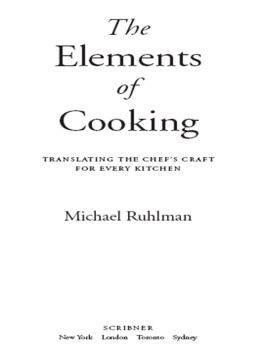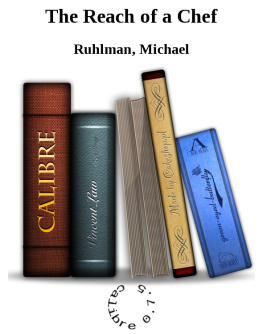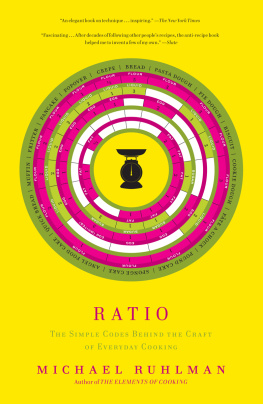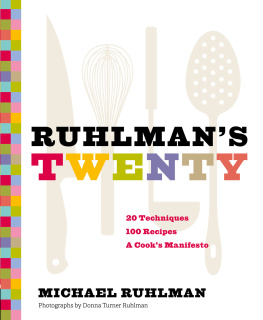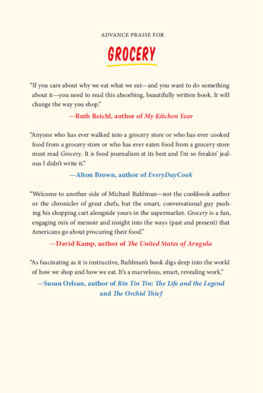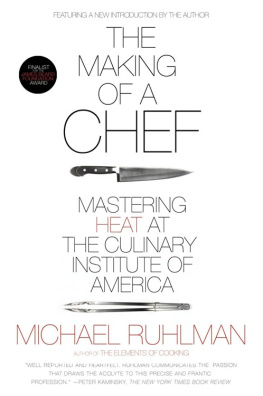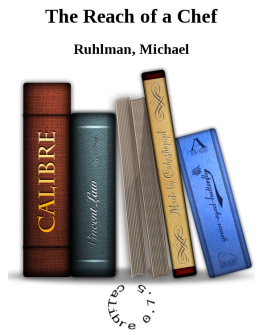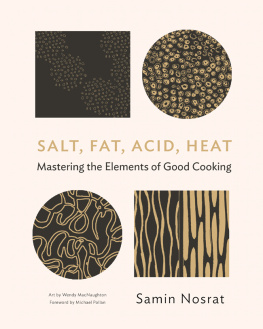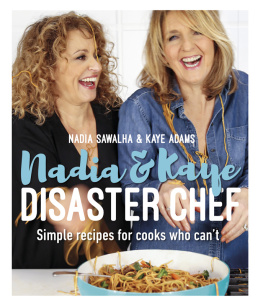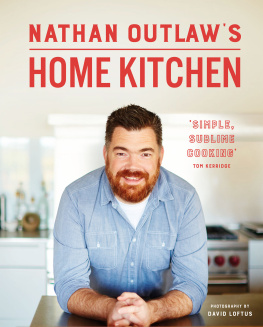INTRODUCTION
by Anthony Bourdain
Its useful these days when everyone, it seems, has an opinion about food, to know what the hell youre talking about. And, if planning to actually cook seriously, its advisable, if not compulsory, to know what it is youre doing. Decoding a menu is hard enough since the explosion of food consciousnesswith its plethora of culinary terms (often egregiously misused)but fully understanding a recipe before attacking ones ingredients with a knife, heat, and good intentions is increasingly a necessity. Its no longer acceptable to dump a handful of vegetables and brown rice into a wok, stir them into mush, then invite your friends over and expect them to be grateful. They now know better.
And if you do somehow manage to properly roast a chicken and serve it with a little sauce, its nice to be able to discuss how, exactly, you did it. Your chicken did not turn brown in the pan by magic. The various elements of your sauce held together for a reason. Others came before youruining plenty of similar chickens and sauces before getting it right. Chances are you have learned, explicitly or intuitively, from their mistakes. The mysterious physical forces of the universe, the history and traditions of the human race, and the basic elements of cuisine combine and come into play every time you pick up a knife and begin to cook. There are fundamentals to consider.
The Elements of Cooking is an opinionated food glossary from a writer and cook who knows better than most what the hell hes talking about. Michael Ruhlman is coauthor of The French Laundry Cookbook with chef Thomas Keller and of A Return To Cooking with chef Eric Ripert, as well as the writer behind an excellent series of books on the training, seasoning, and very soul of chefs. He understands as few others do the basic nature of not just ingredients, but the intangibles in cookingas well as the kind of motivation, dedication and particular forms of madness it seems to require. If someone is going to hold your hand in the kitchen, youd find few better qualified than Ruhlman.
Its all here. In much the same way as Strunk and Whites classic, The Elements of Style, became an essential reference text on every writer and journalists desk, The Elements of Cooking should sit atop every refrigerator. Every bright-eyed and bushy-tailed culinary student shouldand likely willhave a copy, rolled up with their knives.
Eight essays on vital, primary concepts like stock, sauce, salt, eggs, heat, and toolsand an absolutely rock solid definition of every term professional chefs should know as a matter of course after years of working in professional kitchens; now you will learn them easily and conciselywithout burning yourself, cutting yourself, or having your ass kicked in the process. All you have to do is look them up in this book. Every cookprofessional or otherwisewho cares about what they are doing, and why, should own this book. Its that simple.
NOTES ON COOKING: FROM STOCK TO FINESSE
1. STOCK
In the creation of good food, no preparation comes close to matching the power of fresh stock. Its called le fond, the foundation, in the French kitchen for a reason: stock lays the groundwork and will be the support structure for much of whats to come. Stock is the first lesson taught in the kitchens of the best cooking schools for a reason . The finest restaurants in the country are making stock all but continuously; were it not for this fact, they would not be the best restaurants in the country.
Ultimately, well-made stock is the ingredient that definitively separates home cooking from the cooking of a professional. There is no way around this fact. Even if you buy the most expensive prepared stocks and enhance them with your own aromatics, the results will never achieve the clarity and lightness of flavor of dishes made with fresh stock.
However, while its critical to acknowledge the symbiotic relationship between good stock and a good kitchen, theres nothing unfortunate about the fact that few of us will make stock frequently enough to have it always on hand; making stock every other day isnt practical. Two factors mitigating this situation are first, that stock freezes well and second, that stock can be built into your cooking regimen on a semi-regular basis from leftovers and trimmings. And even if you dont take advantage of the freezer or make it a regular, if occasional, part of your routine, its important every now and then to know how to make a stock, whether for a soup, a sauce, a cooking liquid, or simply for the pleasure of it.
What follows are, first, the benchmarks of preparing an excellent stock and second, the important attributes of the main stocks: chicken, beef, fish, and vegetable. (Veal, the most versatile of all stocks, will be addressed separately on page 7.)
The basics are few and easy: good fresh ingredients and low heat.
Stocks are a distillation of flavor, an extraction by water of the essence of the ingredients. If those ingredients are old, or if they are pale and weak, those qualities will be reflected in the flavor of your stock. Ask yourself: Do these ingredients look good, would they be tasty if I were to cook and eat them as they are? If so, theyre suitable for stock. Meat stocks benefit from a good balance of meat (which provides the flavor) and bones and joints (which provide body).
Low heat. Its not enough to say stocks should never boilideally, they shouldnt even simmer. Water 170 to 180F will extract the essence of an ingredient. Agitation from bubbling water can compromise a stock by stirring up fat and other impurities, thus clouding the liquid and compromising its flavor; cooking the meat and vegetables at a simmer tends to overcook their exterior, which will begin to disintegrate before the stocks done, releasing fragments that will soak up your valuable liquid and be discarded after the straining; simmering for extended periods has an oxidizing effect that tends to brutalize and muddy the flavors. Cooking stock at low temperatures requires a little more time, and there are exceptions to the rule, but the benefits of low-and-slow are distinct.
Clarity can refer to two attributes of a stock. The first is its appearance. Is it translucent or opaque? The clearer it is, in most cases, the better the flavor. When you dip a spoon into a white stock, you should be able to see the spoon below the surface; the clearer your view of the spoon, the clearer the stock. With a spoonful of brown stock, you should be able to see the bottom of the spoon clearly; if you cant, its because the stock is cloudy. Clarity can also refer to tasteif, in a chicken stock, the flavor of chicken is distinct, and you can detect the tomato, the sweetness of the vegetables, and the complexity of aromatics, such as thyme and peppercorns, and if it feels light on the palate, not heavy or sticky, it has a clear, clean taste.

